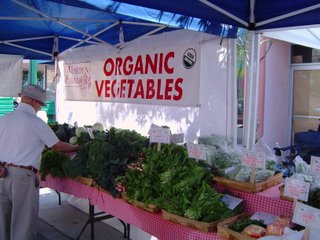 Worden Farms of Punta Gorda is a regular at the Saturday Farmers Market. They are a certified organic, family farm.
Worden Farms of Punta Gorda is a regular at the Saturday Farmers Market. They are a certified organic, family farm.Their produce attracts many shoppers for good reason - it is excellent, fresh, priced fairly, locally produced and available.
Organic foods have been in the news recently - articles about the increasing demand for organic foods putting pressure on the sellers to find adequate supply. Even Wal-Mart is looking at organic foods.
Our downtown grocery store, Whole Foods, has also been in the news. In a recent Slate article, it was noted:
Another heading on the Whole Foods banner says "Help the Small Farmer." "Buying organic," it states, "supports the small, family farmers that make up a large percentage of organic food producers."
This is semantic sleight of hand. As one small family farmer in Connecticut told me recently, "Almost all the organic food in this country comes out of California. And five or six big California farms dominate the whole industry." There's a widespread misperception in this country—one that organic growers, no matter how giant, happily encourage—that "organic" means "small family farmer."
That hasn't been the case for years, certainly not since 1990, when the Department of Agriculture drew up its official guidelines for organic food. Whole Foods knows this well, and so the line about the "small family farmers that make up a large percentage of organic food producers" is sneaky. There are a lot of small, family-run organic farmers, but their share of the organic crop in this country, and of the produce sold at Whole Foods, is minuscule.
A recent Consumer Reports (Feb 2006) article about organic foods describes the "dirty dozen" of fruits and vegetables - those that consistently carry much higher levels of pesticide residue compared to others, even after being washed. The FDA says you should always buy these fruits and vegetables as organic because their conventionally grown counterparts "tend to be laden with pesticides."
The "dirty dozen" includes: apples, bell peppers, celery, cherries, imported grapes, nectarines, peaches, pears, potatoes, red raspberries, spinach and strawberries.
On the other hand, unless price is no object, the following rarely have pesticide residuals when grown conventionally: asparagus, avocados, bananas, brocolli, cauliflower, sweet corn, kiwi, onions, papaya, pineapples and sweet peas.
A few other items are listed on both lists. Check the article if interested.
In the meantime, support the farmers at the Downtown Sarasota Farmers Market!

No comments:
Post a Comment